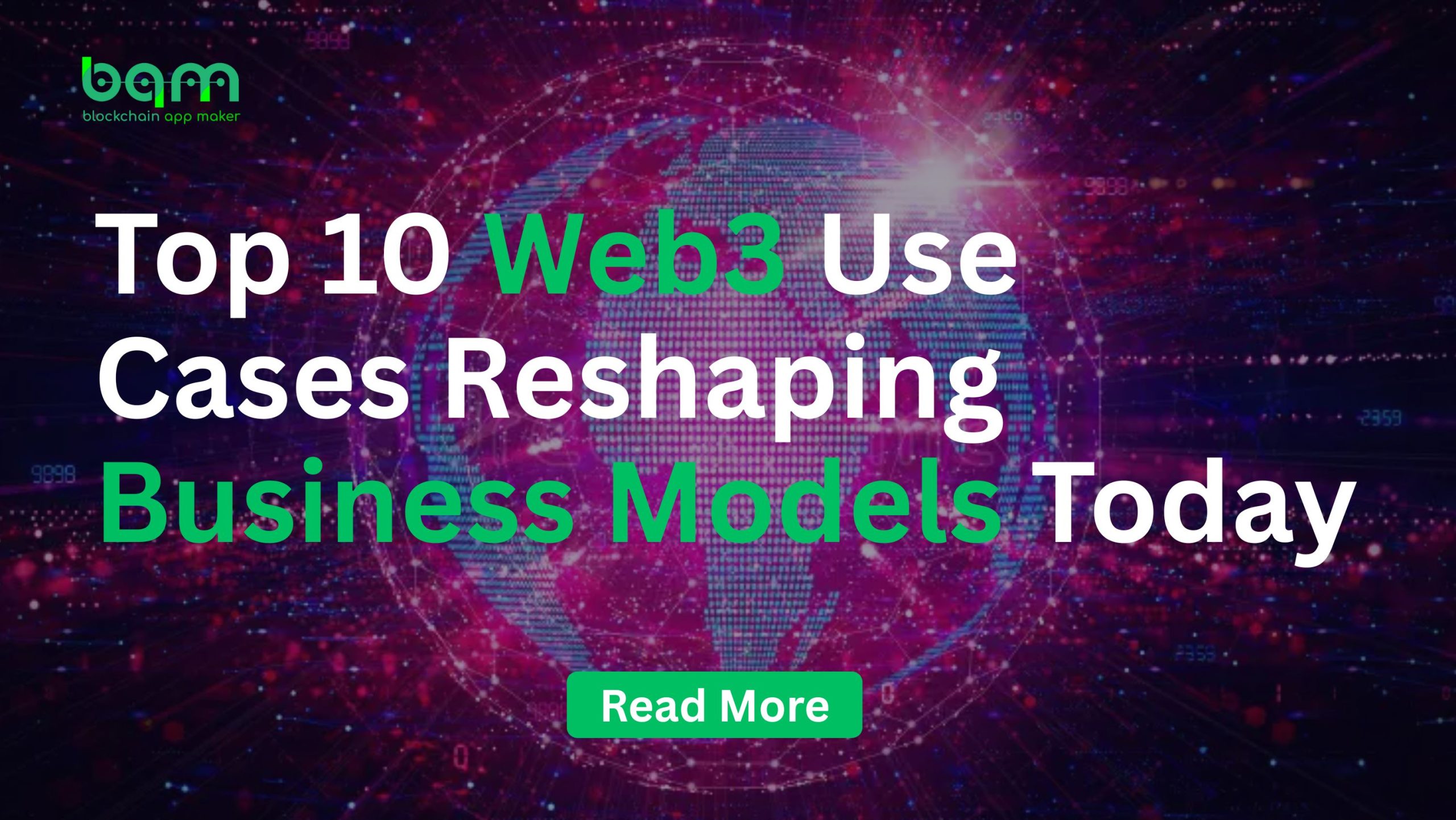Introduction: The Web3 Evolution is Here
The online upheaval is gaining pace and Web3 is in the centre of it. Web3 is revolutionizing how business goes on, how transactions take place, and how value is passed on, powered by blockchain technology and smart contracts and decentralized protocols. In contrast to the centralized Web2 system, Web3 delivers ownership, transparency, and trustless interaction to the users; this way redefining business models in all industries.
In this blog we delve into top 10 Web3 use cases that are leading to innovation in 2025 and beyond. No matter what your business, startup, enterprise, or investor, these trends can put your company in a better position than others.
1. Decentralized Finance (DeFi): Rebuilding Traditional Banking
DeFi protocols facilitate peer-to-peer financial facilities in converting funds without the conduction of intermediaries. Devised on blockchain systems such as Ethereum and BNB Chain, DeFi protocols can provide transparent, programmable and universal financial access.
Key Benefits:
- Reduced transaction charges
- Yield farming and staking Access
- Across-the-border finances
2. NFT Marketplaces: Redefining Ownership & Monetization
NFTs (Non-Fungible Tokens) are digital collectible one-of-a-kind items of the right of possession of art, music, virtual and or real-world property. Companies are utilizing the potential of developing NFTs to tokenize IPs, design special challenger experiences and generate new business models.
Real-world Use Cases:
- Fashion companies that will introduce virtual collectibles
- Real estate tokenization through NFTs
- NFT economies inside games produced by gaming businesses
3. Supply Chain Transparency
Supply chain end-to-end traceability provided by blockchain and Web3 makes it possible to verify the movement and origin of goods in near-real-time and by companies and consumers alike. Smart contracts guarantee automation of logistics and fraud.
Industries Impacted:
- Pharmaceuticals
- Food and agriculture
- Luxury goods
4. Decentralized Autonomous Organizations (DAOs)
DAOs represent governance models driven by smart contracts, which allow the decentralized process of decision-making and community-based business forms. They are suitable to Web3 startups, open-source projects as well as to traditional corporations that aim at decentralized governance.
Why DAOs Matter:
- Transparent operations
- Community engagement
- Automated governance
5. Web3 Identity & Authentication
Web3 allows decentralized identity (DID) applications, which provide users with autonomy over their information and decentralized mechanism of identity preventing login credentials and means of identification. This minimises dependence on centralised systems which are easily hacked and monitored.
Use Cases:
- DApps login systems
- KYC procedures of DeFi systems
- Game and metaverse identity verification
6. Gaming & Play-to-Earn (P2E) Economies
Web3 gaming introduces true asset ownership, in-game NFT trading, and P2E models. Blockchain games issue players with tokens, which is the aspect that stimulates their participation and generates sustainable game economies.
Notable Examples:
- Axie Infinity
- The Sandbox
- Star Atlas
7. Real Estate Tokenization
Real estate tokens can be divided into parts, accessed worldwide, and traded all the time. It enables the investors to purchase and sell the shares of the property in a controlled, safe and transparent space.
Benefits:
- Traditional illiquid asset liquidity
- Reduced barriers of entry
- Fewer documentations through smart contracting
8. Creator Economy & Direct Monetization
The Web3 technologies enable creators to make money on creations without involving third-party services, such as YouTube or Spotify. Under NFT, social tokens, and decentralized streaming, creators are paid by their followers.
Monetization Models:
- Ownership of art/music by using NFT.
- Exclusive access fan tokens
- Web3 content platforms (i.e. Audius)
9. Decentralized Cloud Storage
Web3 Storage networks, such as filecoin and arweave, allow companies to store and exchange data without approaching a centralized network such as AWS or Google cloud.
Why It Matters:
- Censorship resistance
- Lower costs
- Data permanence
10. Metaverse Commerce & Virtual Real Estate
The metaverse combines NFTs, DeFi, and immersive virtual experiences. Brands are establishing virtual storefronts, conducting events and selling online products within metaverse ecosystems such as Decentraland and Roblox.
Commercial Opportunities:
- Virtual real estate investment
- Online product revenues
- Immersive experience with branding
Web3 in Healthcare: Secure Data Sharing & Patient Control
Web3 allows patients to take possession of their Health records, control them, and share it on the perceived decentralized identity (DID) systems and smart contracts. This reduces data leakages and provides its users with real ownership of sensitive health information.
Use Cases:
- Incidences of safe exchange of EHRs (Electronic Health Records)
- Medical research platforms that are based on blockchain
- Smart contracts Patient consent
Web3 in E-Commerce: Peer-to-Peer Marketplaces & Tokenized Loyalty
Web3 is being used to establish decentralized markets on e-commerce platforms that do not have intermediaries and establish customer loyalty through crypto tokens and NFTs.
Advantages:
- Reduced trading charges
- Reward based tokenized systems
- Clear supply chain of products
Environmental Impact & Green Web3 Solutions
With the push for sustainability, many Web3 projects are adopting eco-friendly consensus mechanisms like Proof of Stake and building solutions that promote environmental accountability through on-chain carbon credit systems.
Examples:
- Golden carbon receipts
- ESG reporting on a blockchain
- Sustainability is financed by green DAOs
Legal & Regulatory Implications of Web3 Adoption
There is more scrutiny as Web3 technology becomes more and more adopted. When creating decentralized apps or DAOs, businesses have to operate in a global environment surrounded by compliance, smart contract legality, and privacy laws.
Hot Topics:
- SEC and Web3 token classification
- DAO legal entity frameworks
- GDPR compliance with blockchain data
How to Transition from Web2 to Web3: A Step-by-Step Guide
There are numerous businesses, which are discussing the way of decentralization to the infrastructure. It is possible to have a clear roadmap presented in this section, with key tech, skills and strategy.
Key Steps:
- Audit your current Web2 stack
- Identify decentralization opportunities
- Build MVP with smart contract integration
- Choose a blockchain network (Ethereum, Polygon, Solana, etc.)
- Launch with community-first strategy
Final Thoughts: Why Businesses Need to Embrace Web3 Now
Web3 is no longer a futuristic concept—it’s a rapidly evolving digital framework already changing how businesses operate. Web3 is opening the doors to safer, more efficient and user-owned systems: both in financial services and digital identity, as well as in creator monetization.
If you’re looking to integrate Web3 into your business model, Blockchain App Maker is your trusted Web3 development partner. From DAO creation to NFT marketplace development, we offer scalable and secure blockchain solutions tailored to your industry.




